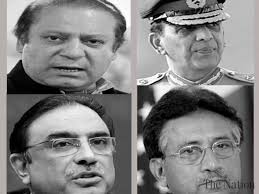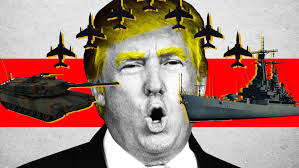The Narrative of Civil-Military Divide Strikes back in USA
- Saleem Qamar Butt

- Apr 19, 2020
- 6 min read
The mischievous narrative of civil-military divide in Pakistan had been discussed in the Western Media and Thin Tanks for decades under the guise of academic and political reasons. It is well known by aware masses that in all such attempts, the target was always Armed Forces in general and Pakistan Army in particular. The main reason cited for that had been role of the Armed Forces for repeatedly ruling the country, along with well known political class nevertheless. It is ironically sad that the elite turned politicians and their well personified political parties used the toes and shoulders of the military rulers in order to make a short cut to the power corridors. However, whenever a political party or its leadership got out of power due to charges of corruption, elimination of opposition and incompetence, they were quick to develop nexus with the hostile foreign intelligence agencies to do mudslinging on the military institution and its leadership. The second main reason for anti- military drive had been Military’s efforts to induce or even impose some semblance of honesty, efficiency and accountability on the political elite and civil administration working hand in glove for loot and plunder of the national wealth (even some uniformed guys also got tainted in the process). The details of Memo-gate scandal and Dawn leaks and the connection of the two main political parties with the hostile foreign intelligence agencies are well known and available on the internet for those who would like to refresh their memories. The sacking of the Chief Justice and two serving Chief of Army Staff on flimsy grounds and in an ignominious manner had its domestic politico-economic backlash, besides relentless damage done to the morale of the Armed forces. While controversial military rule in Pakistan has its well documented history and reasons. However, despite finding it much easier to deal with a single authoritarian ruler, American media and establishment was always in the lead to unleash severe criticism and even plot overthrow of the same military ruler whenever he was found to be sluggish on delivery as per American diktat. General Ayub Khan, General Zia Ul Haq and General Musharraf can be quoted as examples, which left behind their respective political legacies that audaciously continue to bite the hands that nourished them. All the same, the nefarious narrative of civil-military divide is mostly kept alive and it continues to crop-up through local and foreign sponsored Trojan Horses of different sizes as and when required. The aim is always to undermine the Centre of Gravity of the country, being the sole disciplined and efficiently functioning institution in Pakistan right from the independence. Since indulgence in anti-Army discourse pays well and also helps in undue projection by the invested media, therefore some people adopt it as a trend. Again in such wayward environment every blackmailing Tom, Dick and Harry finds it convenient to claim itself as a pillar of the state. No wonder why the state’s structure keeps trembling like a Jenga Tower. Thanks to Almighty, the satisfying fact remains the successful damage control ensured by the state intuitions, who continue to sacrifice their sacred blood in defending the motherland on all fronts.
The current pandemic named COVID-19 has turned the tables on the whole globe and the most developed world and scientifically most advanced humanity stands humbled in the face of an invisible virus. Likewise, American media, think tanks and invisible hands that had remained associated with the narrative of civil-military divide in Pakistan in one way or the other, today stand facing the same stigma under POTUS Trump. According to Washington post, at the commencement of his presidency, Trump took a good pro-military start pushing for higher defense spending; sending more U.S. forces and firepower to Afghanistan, Iraq, and Syria; and liberalizing the military’s rules of engagement, giving commanders on the ground more freedom of maneuver. Again his appointment of generals to senior civilian positions looked promising as an adult management: the retired Marine Corps General James Mattis (called a true General’s General by Trump) became the secretary of defense, the retired Marine General John Kelly became the secretary of homeland security and then the White House chief of staff, the retired army lieutenant general Michael Flynn became Trump’s national security adviser (he was pushed out in just 24 days) and he was replaced by the then serving lieutenant general H. R. McMaster. However, the scenario started taking ugly turns soon thereafter and the pledge of smooth civil-military relations became rather bitter, as covered in four recent books i.e., “Trump and His Generals”, “ A Very Stable Genius”, “Holding the Line” and “Call Sign Chaos”. According to “The Military Times”, surveys of military personnel reflect this dissatisfaction: when Trump was first elected, in November 2016, 46 percent of respondents had a positive view of him, and 37 percent had a negative one. By November 2019, a stark change had taken place: 42 percent positive, 50 percent negative.
American analyst Max Boot discussed in details the main reasons for alarming American civil-military divide in a piece, which are summarized here: Trump temperamentally attacking the war hero like John McCain(who was a Republican senator), belittling the parents of a soldier who had died in combat after they dared to criticize him, Trump’s difference of opinion with General Mattis and Pentagon on the efficacy of U.S. led system of security alliances and trade relationships with allies, president’s notoriously short attention span and a hair-trigger temper and habit to openly fume during presentations by establishment, publicly undermining Langley and State Department, shaming senior administration by names to cover up his own ignorance and personality weaknesses( in common with the said Pakistani political leadership), pulling out of the Iran nuclear deal, abandoning NATO’s mutual-defense provision, an order in early 2018 to evacuate American civilians from South Korea in preparation for a possible military strike on North Korea, Mattis objection to Trump’s initial decision to pull U.S. forces out of northern Syria and Afghanistan (Trump has since abandoned the Syrian Kurds by relocating U.S. troops to Syria’s tiny oil fields, and he has agreed to withdraw all U.S. troops from Afghanistan by May 2020 as part of a deal with the Taliban to the dismay of establishment), and finally Trump’s relentless self-promotion, contempt for underlings, and disdain for expertise (again sounds familiar with Pakistani political elite).
American political analyst opine that Trump’s attempts to bend the Defense Department to his will, employ it for political purposes, and purge it of all dissenting viewpoints will only accelerate if he wins another term. The generals who were hailed as the “axis of adults” are long gone, and their successors, military and civilian alike, have gotten the message about what happens to any official who dares to stand up to a mercurial and wrathful chief executive (Pakistani establishment had been facing the same traumatic conditions during so called democratic rule). The longer Trump stays in office, the harder it will be to safeguard the apolitical traditions of service to the nation, dedication to the rule of law, and loyalty to the Constitution, which are the hallmarks of the American armed forces. Almost similar reasons and weaknesses had been the bone of contention between civil and military leadership in Pakistan, which sponsors and supporters of such malicious narrative might disagree with. Thinking people in America hope that if Trump loses in November, the process of repairing the damage can begin. However, in order to make sure that constitutional norms and institutions should not be harmed by a power hungry populist demagogue, U.S’ Congress may have to impose greater limits on the president’s authority to prevent abuses such as political interference at the Department of Justice and troops’ deployments for political purposes. Congress is already taking action to limit the president’s war-making authority—for example, by repealing authorizations for the use of military force. It is interesting to mention here that Serving in the military isn't a prerequisite for becoming president. Nonetheless, out of the 45 presidents of the United States, 29 had some military experience in their background, according to the US Department of Veterans Affairs. This seems fitting, given that the president is the commander-in-chief of America's military. Trump’s maverick handling of the military commanders and other establishment chief executives can be partially or wholly attributed to his glitzy reality show background instead of military eperience and the same is true for juvenile behavior of civilian prime ministers in Pakistan.
It is hoped that Pakistani political elite would learn to govern better by acquiring better qualifications and experience rather than thriving on scheming, negative practices and blackmailing illiterate or semi-literate masses by ill-gotten money…..only then the narrative of civil-military divide would die its own death forever. It is also expected that American concerned quarters after having experienced the real civil-military divide at home, would refrain from propagating or supporting the same in other countries.
11 th April 2020
· Saleem Qamar Butt, SI (M), (R) is a senior Army officer with rich experience in International relations, military diplomacy and analysis of geo-political and strategic security issues. (Website: www.sqbutt.com )









Comments